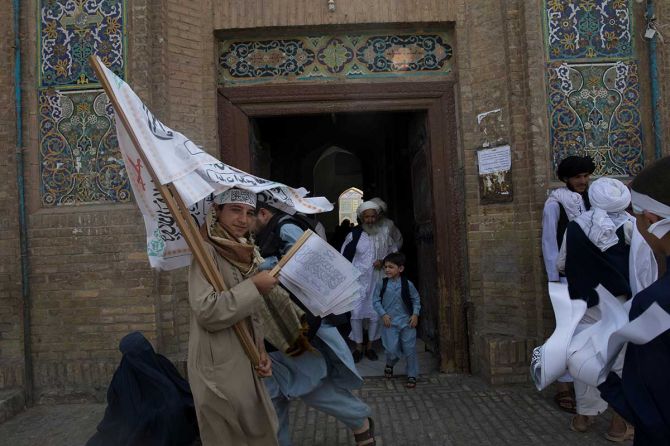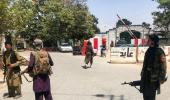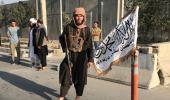Pakistan is making efforts at multiple levels for the Taliban government to have a soft landing, observes Ambassador M K Bhadrakumar.

The Taliban hoisted their black and white flag on the presidential palace in Kabul on September 11, which happens to be the 20th anniversary of al-Qaeda's attack on New York and Washington, DC. The symbolism is too obvious to be missed.
Although the Taliban had no hand in the 9/11 attacks, it took the brunt of the US's revenge act to invade Afghanistan.
No doubt, the flag hoisting is an assertion by the Taliban that they have returned as the ruling elite 20 years after their government was overthrown, and that is a reality the US cannot ignore.
In an exclusive interview with the Chinese Communist Party daily Global Times, Taliban spokesman Suhail Shaheen revealed that talks on government formation are still going on.
'We believe in the inclusiveness of the government,' Shaheen insisted, adding that the final shape of the government will be known during September-October.
Former president Hamid Karzai is taking an active role in the consultations regarding government formation. Karzai presided over a gathering of several elders, religious scholars and youth from the central provinces.
A tweet later said, 'During the meeting, the speakers called for complete peace and stability in the country and expressed the hope that the caretaker cabinet would be inclusive as soon as possible and all the people of Afghanistan are part of it.'
'Endorsing the opinions of the gathering, the former president emphasised the security and stability of the country and said the inclusiveness of the government would reflect the face of the whole country.'
The Hazara population hopes to have representation in the Taliban government. The Taliban is also talking to other ethnic groups.
Meanwhile, a regional process is steadily taking off to address the Taliban takeover in Kabul. Pakistan has taken the initiative in this regard.
Thus, a foreign minister level meeting of the countries neighbouring Afghanistan -- Pakistan, Iran, Turkmenistan, Uzbekistan, Tajikistan and China -- was held on September 8.
Notably, Chinese Foreign Minister Wang Yi played a proactive role in the deliberations by exhorting the neighbouring countries to 'help Afghanistan get out of chaos'; 'exert a positive influence on the situation'; and, 'guide and urge the Afghan Taliban to unite with all ethnic groups and factions, build a broad and inclusive political structure, pursue moderate and prudent domestic and foreign policies, draw a clear line with terrorist forces, and establish and develop friendly relations with other countries, especially neighbouring countries.'
Wang said the Taliban has recently made positive statements on issues such as forming a government, fighting terrorism and making friends with its neighbours.
'We welcome the statements and the key is to transform them into concrete action,' Wang he told the other foreign ministers.
Wang underlined that the neighbouring countries have a 'unique role in providing a good external environment' for Afghanistan's stability and reconstruction while addressing their own legitimate concerns.
A tangible outcome of the meeting is that the foreign ministers forum has been institutionalised. Iran has offered to host the next meeting in a month or so.
To be sure, Iran coming on board can be a game changer. Tehran is walking the fine line, voicing misgivings about the formation of the next government while engaging the Taliban and keeping the border open.
During a United Nations security council meeting on Thursday, September 9, regarding the Afghan situation, Iran's permanent representative to the UN Majid Takht-Ravanchi slammed the Taliban's attack on Panjshir.
In his words, 'The recent unjustifiable attack and condemnable fratricide in Panjshir is in contradiction with the united position of the international community, according to which any government that comes to power in Afghanistan by force will not be recognised.'
Takht-Ravanchi said the path to stability, lasting peace and sustainable development passes through intra-Afghan negotiations with the active participation of all ethnic, linguistic and religious groups, with the aim of finding a fair and lasting solution to the crisis and achieving national reconciliation.
The Iranian PR underscored the need for the formation of an all-inclusive government through a free and fair election, with the participation of women both as voters and as candidates.
However, Iran will act with great restraint, its top priority being the stability of Afghanistan. Security considerations are uppermost in Iran's calculus.
Last week, the IRGC's Quds Force Commander Esmail Qaani personally briefed the Majlis in a closed door session, sharing sensitive intelligence details regarding the security situation in Afghanistan.
Later, a Majlis spokesman told the media that Tehran has 'complete knowledge' about the developments in Afghanistan and 'We cannot be indifferent to these developments.'
General Qaani spoke 'accurately, strongly' with relevant intelligence dossiers, he added.
From time to time, reports have appeared that General Qaani (who succeeded General Qassem Soleimani in the US drone strike in Baghdad last year) has been Tehran's point person on Afghanistan and kept good relations with Taliban leader Sirajuddin Haqqani.
Tehran has expressed concern that certain conspiracies are afoot from outside to pit Sunnis against Iran in Afghanistan. This appears to have been a veiled reference to the Arab countries that are active once again in Afghanistan, especially the UAE (which is aligned with Israel) and Qatar.
Iran had faced such a regional line-up in Syria where Qatar, Saudi Arabia and the UAE funded and equipped extremist groups, including al-Qaeda affiliates.
Therefore, it is significant that Iran responded to the invitation from Pakistan's ISI chief Lieutenant General Faiz Hameed for a meeting of the heads of intelligence agencies of Russia, China, Iran and Tajikistan in Islamabad.
Equally, Russia's participation in the meeting of intelligence chiefs in Islamabad marks Moscow's renewed interest to coordinate with Pakistan on security issues and to leverage Islamabad's influence with the Taliban, its tacit political support for the revolt in Panjshir notwithstanding.
Pakistan is making efforts at multiple levels for the Taliban government to have a soft landing.
Conceivably, the Pakistani objective will be to rapidly develop a regional consensus that would include a common position on according recognition to the Taliban government. To be sure, China is backing these Pakistani initiatives.
Feature Presentation: Ashish Narsale/Rediff.com











 © 2025
© 2025